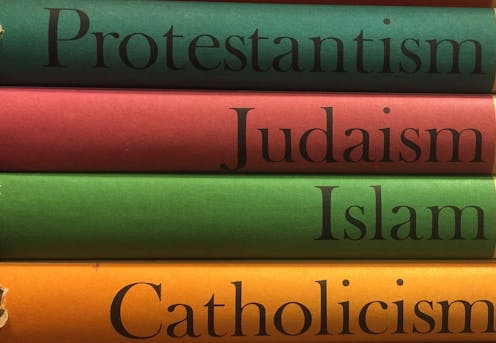Australia needs a better conversation about religious freedom
- Written by Scott Kirkland, Postdoctoral Research Fellow, University of Divinity

Tomorrow, the Ruddock inquiry is due to release its findings on whether Australian law adequately protects the right to freedom of religion. The timing of this inquiry comes on the back of marriage reform.
It’s hard not to see the inquiry as an effort to appease Christians who opposed the reform. The published submissions certainly suggest this is the major issue. But there is hope it may engender a more interesting conversation over the nature of Australia’s diverse democratic secularism.
What it is examining?
The question of freedom of religion has become entangled in the relationship between Christian resistance to same-sex marriage and the reality that Australia has democratically decided to amend its marriage laws.
Read more: The 'gay wedding cake' dilemma: when religious freedom and LGBTI rights intersect
We will probably also see the question of the relationship between Sharia and Australian law raised. And we will see freedom of speech and its relationship to freedom of religion raised again, so we can negotiate cases such as Israel Folau’s recent comments on homosexuality and divine judgement.
We will also see the issue of the right to freedom from religion raised. For example, there is a live question over the difference between coercive evangelism and religious education.
The place of religious education in schools is a highly contested issue in Australia. There are complicated questions around physician-assisted suicide and religious hospital systems that need careful consideration, too.
It will also be telling to see if the review considers the relationship between indigenous spiritualities and Australian law.
What is freedom of religion?
Part of the reason we are having a conversation about religious freedom is because of the way we have defined religion. This has been discussed in the preliminary 2017 Interim Report: Legal Foundations of Religious Freedom in Australia. The definition proposes some belief in “a supernatural Being, Thing or Principle” and the manifestation of this in action described in canons of conduct.
Academics have long found religion a problematic category.
First, the definition is vague and restrictive at the same time. What counts as “supernatural” is unclear, in that the implication is it’s in opposition to the secular. This definition of supernatural is already loaded in favour of the way Western modernity has emptied “secular” spaces of “religious” concerns. It supposes religious people can, with intellectual integrity, do the same.
Second, the definition risks simplicity in that it implies there is a relationship between “belief” and “manifestation” that can be circumscribed. Rather, this is a complicated space of intellectual, moral and political judgement in communities of faith. Religious traditions involve complex conversations about all manner of things “secular”: from the economy to health, from transportation to war.
What the report describes as absolute about religious freedom is the right to hold religious beliefs, not the right to manifest them. For instance, one may hold the belief that the world was created in six days, but one would not have the freedom to manifest that belief in a public science classroom.
There are situations in which manifestation conflicts with the freedoms of others, causing harm. This resembles what Isaiah Berlin called “negative liberty”: freedom as choice without interference from others or external constraint.
This cuts both ways. Religions are free to make their own moral judgements, and government is to be free from these prejudicial judgements.
Is there a way forward?
The discussion has, as far as the available submissions indicate, been a question of negative liberty. It has been full of requests for exemptions from legislation, such as the freedom to discriminate on the basis of sexuality in performing marriage ceremonies. These are important considerations for the inquiry.
But freedom could mean something different. It could mean freedom to take part fully in a vibrant dialogue over the nature of our lives together. This would require thinking carefully about our definitions of religion and the secular.
Read more: Labor is right to block 'religious freedom' amendments to protect same-sex marriage bill
The problem with the working definition of religion is simply that it is not complex enough. These various intellectual, moral and spiritual traditions involve traditions of storytelling and arguments over the nature of – among other things – human life, rationality, beauty and justice. All of these intersect variously with complex issues including race, class, gender, ethnicity and sexuality.
This is very similar to secular philosophical traditions. To constrain religion to a belief about transcendence that manifests in moral commitments is to define religion restrictively and potentially violently. It also cuts us off from interesting conversation partners.
Can our secular democracy establish a way of allowing religious voices into the public space in a way that we look to one another as sources of enrichment? We will inevitably disagree, but can we do so with a commitment to respectful argument? If freedom just means my right to assert myself without regard to others, it is difficult to sustain a healthy political culture.
We must protect people from harmful speech. Nobody has the right to harm another. This space must be hospitable. But the cause of freedom must exceed the creation of religious exemptions. We deserve a richer conversation over how to be free with rather than from one another. Let’s hope the inquiry inspires this.
Authors: Scott Kirkland, Postdoctoral Research Fellow, University of Divinity
Read more http://theconversation.com/australia-needs-a-better-conversation-about-religious-freedom-96411





